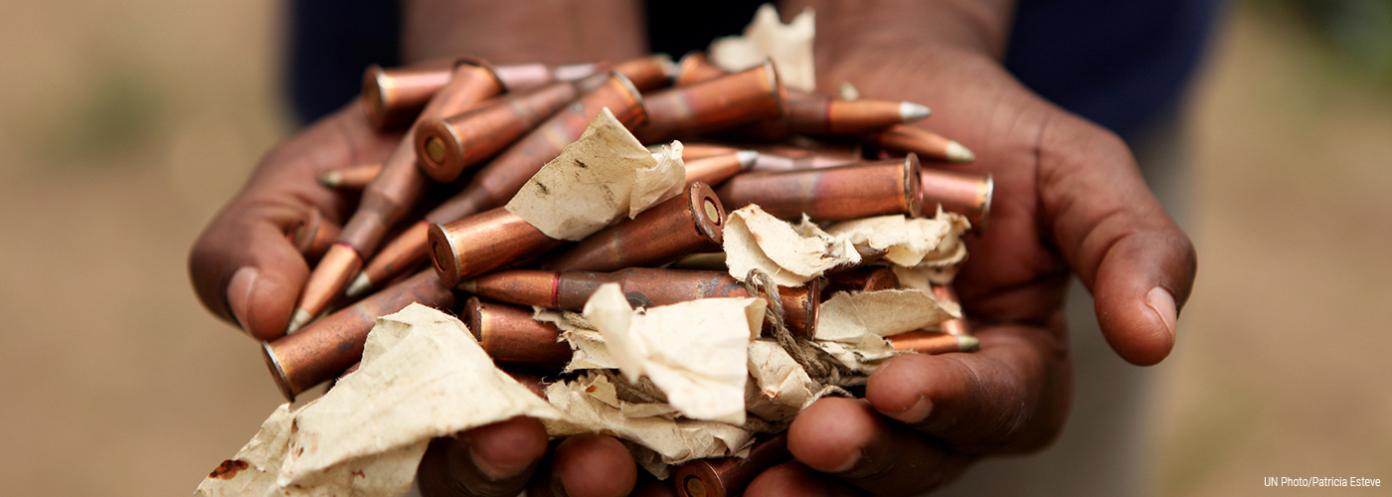Around the world, the sharp crack of a distant gunshot can stir up a range of terrifying emotions for the people that live there. This can include a paralyzing fear for your family's safety, worry that violence is heading towards you, sadness that somewhere, a family has lost a loved one.
Whether in the devastating battles of Syria and Yemen; on the high-crime streets of Honduras and Jamaica; or amongst the violent extremists who have terrorized many parts of sub-Saharan Africa -- there is a familiar thread emboldening those with nefarious intent. That thread is illicit firearms.
The United Nations works in many fragile countries around the world. Whether a nation is generally stable but has a high level of crime or gang violence, is post-conflict and trying to get back on its feet, or is an active war zone, the presence of unregulated small arms hurts everyone in these societies, and often in very diverse ways. For example, in countries such as Honduras, El Salvador and Jamaica, the presence of illegal weapons smuggled from neighbouring countries fuels crime that has led to these countries having among the world's highest homicide rates; in Cameroon and the Chad Basin, illegal weapons -- often hand-me-downs from successive conflicts - embolden violent extremists; and in Pakistan, armed groups have even used their illegal guns to prevent girls from going to school and children from receiving vaccines.
In every country where they are present, violence caused by illegal firearms undermines prospects for sustainable peace and development.
And the use and misuse of these weapons affects men and women, boys and girls very differently. Firearms in the home, for instance, increase the likelihood of fatal domestic violence. Globally, guns are deeply tied to sexual and gender-based violence, especially during conflicts, and are often associated with a perceived link to masculinity: Men are many times more likely to own or possess a firearm than women.
Controlling the proliferation of illicit small arms is a persistent challenge. In places where governance and the rule of law are already weak, we have seen that simple bans often don't work. Aggravating the problem is the fact that the illicit trade in small arms and light weapons has an estimated value of over US$1 billion.
What is needed is an approach that tackles this challenge holistically, not piecemeal -- an approach that focuses on long-term and sustainable impact, and that places emphasis on addressing both the "demand" for small arms, as well as the "supply." An approach that will complement, but not displace, more narrowly focused activities, such as marking firearms or weapons buyback programmes.
For this reason, the U.N. launched the Saving Lives Entity, or SALIENT -- a fund designed to address the full spectrum of challenges of illicit small arms and their complex social impact. With financial contributions from a number of governments including Japan, SALIENT is dedicated to helping countries tackle small-arms-related challenges as part of a comprehensive approach to long-term security and development. It is part of a broader U.N. effort to deliver consistent, reliable support to the countries most affected by illegal arms.
A lack of data on armed violence commonly prevents officials from fully understanding the problem. Arms smugglers may exploit weaknesses in border control, both at formal checkpoints and at unofficial ports of entry. This is exacerbated by the way that firearms can become entangled in cultural concepts of masculinity, making gun ownership an outsized part of how men and boys understand themselves and their place in society.
To tackle such issues, SALIENT is bringing together partners across governments and localities to support foundational activities in Cameroon, Jamaica and South Sudan. These countries are pursuing actions such as measuring how well their local police understand national firearms laws, administering firearms registration drives, and training women to become disarmament leaders in their communities.
We are just beginning a journey that will require commitment and patience -- as well as sustained and predictable financial support to fully realize its goals. Small-arms regulation and control are not simply a remedy to a short-term public security issue, but a long-term investment in a country's social, political and economic development. The focus is not on the weapons, but on people and saving lives. These actions will benefit not only the most affected countries but the entire global community.
This article was originally published in The Mainichi.

 Locations
Locations

